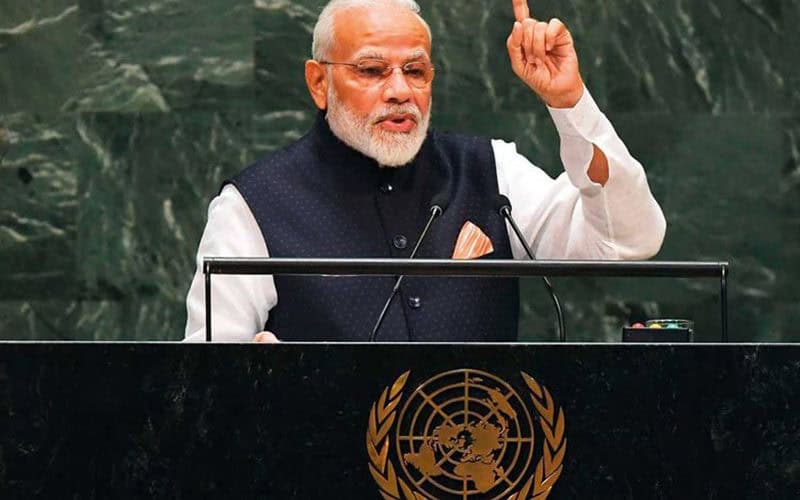India seemed to dominate the narrative on Jammu and Kashmir on the sidelines of the United Nations General Assembly Session, European Foundation for South Asian Studies (EFSAS) has said.
In its commentary dated September 27 and published on its website, EFSAS, EU accredited, non-profit think tank and policy research institution, cited several examples to compare the diplomacy by the two countries and how India outplayed Pakistan.
“The direction in which the India-Pakistan confabulation was heading became strikingly evident at the first major event on Indian Prime Minister Narendra Modi’s week-long calendar in the United States (US),” EFSAS said referring to the ‘spectacular’ ‘Howdy Modi’ event in Houston on September 22.
It called the event where an audience of 50,000 gathered to hear PM Modi address as an “unmistakable display’ of display of India’s soft power.
“That in itself was not novel or remarkable. Modi has over the last five years been gracing such community events on several of his visits abroad. The difference this time was the presence and active participation of US President Donald Trump as well as several other US dignitaries at the event,” the think tank said in its commentary.
The commentary also mentioned the lavish praise heaped by Prime Minister Narendra Modi and US President Donald Trump on each other.
“Trump saw the event as an opportunity to swing a sizeable proportion of the four million people onto his side on the back of a nudge by Modi, who commands tremendous respect and admiration among expatriate Indians,” it said.
The EFSAS stressed that PM Modi “cleverly used the occasion to get Trump’s implied concurrence on his decision to withdraw the autonomy enjoyed” by the Jammu and Kashmir.
It also talked of how Modi took a dig at Pakistan and to assuage any concerns that the US dignitaries in attendance, and the world at large, may have had following India’s moves on Jammu and Kashmir, Modi used the occasion to assert in multiple Indian languages that “all is well” in India.
The tone for the UNGA had been set, said EFSAS.
Referring to Pakistani Prime Minister Imran Khan’s participation in an event organised by think tank Council on Foreign Relations (CFR), it said, Khan “inadvertently succeeded in painting a very sorry account of where his country stood.”
It also slammed the hypocratic stance by Pakistani Prime Minister who chose to feign ignorance on China’s ill-treatment of its minorities.
“Khan, quite hypocritically given his keen interest in the fate minorities in India, chose to feign ignorance on China’s ill-treatment of its minorities by claiming, quite unbelievably, that he did know much about the matter as he had “enough on his plate” with issues concerning the economy and developments on his country’s Afghanistan, Iran and India frontiers,” it said.
The commentary said Khan didn’t fare much better at the meeting with US President.
It also noted that during the meeting with PM Modi, Trump refrained from the mention of mediation on Jammu and Kashmir and urged Modi and Khan to find a solution.
Quoting External Affairs Minister (EAM) S Jaishankar wherein he said India doesn’t have a problem talking with Pakistan but “terroristan”, it said, “On Pakistan’s shrill reaction to India’s 5 August moves in J & K, Jaishankar asserted that Pakistan is stressed because it fears that its “investment” of 70 years on terrorism would be undercut if India’s policy succeeds.”
A combination of factors contributed to Pakistan’s ineffectiveness, it asserted, stating that Pakistan’s game plan to exploit the UNGA occasion to internationalise J-K, “achieved scant little success.”
It said Pakistan’s “diplomatic clout”, whatever little it possessed was, eroded by political instability and economic insecurity within that country, adding it was compounded by its near-total dependence on other countries, particularly China, for its very survival.
“India’s stock, on the other hand, is high,” it said owing it to its traditional standing in the international domain as a responsible member of the community, its economic prowess and emergence as an attractive destination for business and the effectiveness of its small but efficient diplomatic corps.
“But above all, India’s democracy that lends legitimacy to its words and actions contrasts sharply with the dominance of the Pakistani military establishment over the country’s polity,” it added.
The commentary said it came as no surprise when “Khan admitted failure and bewailed on 24 September that “To be absolutely frank, I am a bit disappointed by the international community. There is no pressure on Narendra Modi to lift the siege (in J & K)”.

